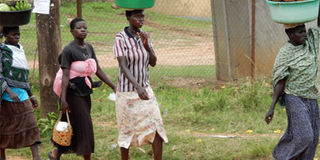Prime
Women to share Shs190b under parish model

Left: Women hawking fruits. PHOTOs/file
What you need to know:
- Government is set to roll out the implementation of the Parish Development Model, the latest of attempts to turn around service delivery and alleviate poverty at the grassroots.
Women will take 40 per cent (Shs196 billion) of the Shs490b allocated for the Parish Development Model (PDM), the latest government initiative to eradicate poverty in Uganda.
This was revealed by Ms Mastula Namatovu, National Women’s Council publicity secretary, while meeting journalists in Lira City on Friday.
“So, we urge our women’s council leaders to work hand in hand with the people at the district to help us identify our women to benefit from this programme,” she said.
“Apart from the Parish Development Model, UWEP (Uganda Women Entrepreneurship Programme) is still on and as women’s leaders, we should continue to stamp and append our signatures on the paperwork before it is approved,” Ms Namatovu added.
Ms Linda Auma, the Lira District Woman MP and vice chairperson of National Women’s Council, said so many programmes are on the way to get women out of poverty.
The team was in Lira City to hand over official stamps that were procured by the National Women’s Council Secretariat for all district women councils in Lango Sub-region.
The stamps are expected to improve work and reduce cases of forgery of documents that affected the performance of the women council.
During the handover ceremony, Ms Namatovu urged women council leaders to mobilise sensitise women and “monitor whatever is going on in our communities.”
The Local Government Act provides for women council leaders chairpersons both at the village and parish level as secretaries for public health.
Ms Anna Alum, the Kole Women’s Council chairperson, hailed the secretariat for procuring the official stamps.
“Now that we have received these stamps, I believe the business of forging our signatures to approve funding of women’s groups will stop,” she said, adding that some corrupt district leaders used to identify “ghost” women’s groups and approve them without their knowledge.
Appeal
“It’s now our role to go and tell our fellow women at the grassroots that we have our stamps. If the forms are not stamped by the stamp of the National Women’s Council, it is going to be invalid,” she added.
Mr Morris Chris Ongom, an economist, noted that for the Parish Development Model to succeed, the government should work on the issue of corruption, which has continued to cripple all development programmes.
Mr Ongom, who is the executive director of Global Forum for Development (GLOFORD), an NGO working in Lango, said there is also a need to strengthen the cooperatives to work more effectively to drive this agenda.
“Yes, money is coming but which institutions have been built to be trusted to drive this model?” he said.
“Is the PDM basically hinged on the assumption that the only constraint of development at parish level is lack of financing? If so, then we shall replay Emyooga, Youth Livelihood Programme, Youth Venture Capital Fund rhythms with very limited economic outcomes,” he added.
About programme
Government is set to roll out the implementation of the Parish Development Model, the latest of attempts to turn around service delivery and alleviate poverty at the grassroots.
The model will see development activities planned for and executed in parishes, as the lowest level unit for planning and development, as government moves to advance the benefits of decentralisation.




